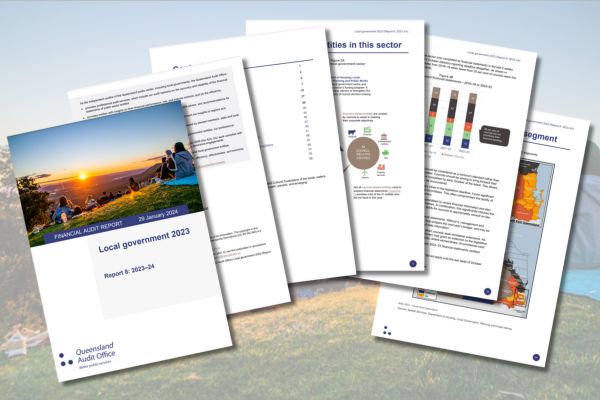Using the recommendations in the QAO Report to streamline procurement in your council
Feature article by Peak Services
The recent findings from the Queensland Audit Office’s ‘Local government, Report 8: 2023-24’ financial audit report show there are still many areas that councils can improve on when it comes to procurement practices and processes.
When implemented, many of the recommendations in the report will assist your council to streamline processes, help reduce risk, comply with relevant legislation and council policies, and improve efficiency.
These recommendations seem simple on paper but often take time and resources by skilled professionals in dedicated areas to ensure implementation is suitable and relevant and adheres to relevant regulations, legislation, and council policy.
We’ve looked at the QAO report recommendations and identified some simple ways to improve procurement practices within council:
1. Implement and regularly review policies and procedures
QAO finding: “Councils should regularly review and update their policies and procedures to ensure they are up to date and meet the needs of their operations. Each council should develop a work plan to ensure all policies are reviewed at least every 3 years or when there are significant changes to the council’s structure.”
Councils are custodians of public money and must ensure all procurement processes are conducted in accordance with procurement policy, good financial and contract management practices and openly and transparently. Failing to ensure adequate internal controls in the procurement and contract management processes and practices, not only exposes council to financial risk, but also the risk of fraud and corruption.
Implementation and regular review of policies and procedures are vital actions for keeping important guiding documentation relevant and front of mind across the council.
2. Set up an audit function inside council
QAO finding: “More action is needed on outstanding high-risk issues. There are still 121 unresolved significant (high-risk) issues (2022: 114) at councils. This will increase as we finalise the audits of the 14 councils who failed to meet the statutory deadline. We continue to see a greater proportion of long-outstanding issues in councils that do not have an audit committee or internal audit function.”
Determining compliance with policies and procedures is one thing. Monitoring and assessing ongoing compliance and the quality of internal controls is another. Evaluating the quality of risk management in procurement regularly through an audit function gives new meaning to active risk and governance management. Implementing an audit function is straight forward and really effective in actively managing procurement and related risks.
3. Assess the maturity of your procurement and contract management practices, and implement identified opportunities to strengthen your practices
QAO finding: All councils assess the maturity of their procurement and contract management processes. Councils should identify their desired level of maturity and compare this to the maturity level that best represents their current practices. This assessment will help them identify and implement practical improvement opportunities for their procurement and contract management processes. Maturity areas including:
1. Financial delegation /approval of expenses
2. How to demonstrate value for money
3. Maintaining contracts registers
Such an assessment must include a current state review, review of existing documentation and corporate and operational plans, and identifying councils’ vision and objectives. A category spend analysis may be required, as may a functional analysis including organisation wide engagement and resourcing (centre-led, decentralised, centralised, other). And a benchmark review of existing practice(s) against global best practices for similar councils or organisations. These types of analysis, along with others, will support the realisation of fit for purpose procurement and contract management functions. Various tools are available through the state government, CIPS and other global best practice entities.
Selecting the right methodology, approach and tools for your council will enhance outcomes and benefits realisation. Gathering data and analysing it in the context of council is important, as is working and engaging with inter-departmental stakeholders. The maturity assessment should present real and tangible evidence to support recommendations for feature alignment with corporate and operational planning and best practice procurement; presenting a clear roadmap to close the gap to achieve better practice procurement functional maturity standards.
4. Maintain and administer strong procurement and contract management practices
QAO finding: Councils need to ensure they obtain value for money for the goods and services they procure, and that they have the appropriate approvals to procure the goods and services. To effectively manage their contractual obligations, councils should ensure their contract registers are complete and contain up-to-date information.
Peak's article from February 2023, Procurement Framework to ensure consistency and compliance, provides an outline of how to implement a Procurement and Contract Management Framework (PCMF) in local government. This framework is essential in local government because tailoring an effective PCMF for your specific council needs, governance and risk management is necessary to meet the governance and integrity standards expected by the communities you serve. A fit for purpose PCMF means the difference between being able to maintain and administer strong procurement and contract management practices and not meeting compliance regulations. Establishing a comprehensive procurement pipeline or future procurement plan, that’s agreed across council through a Contract Register and/or Forward Procurement Plan, can greatly assist procurement management practices.
Peak Services is a subsidiary of the Local Government Association of Queensland (LGAQ) and is also a pre-qualified supplier on Local Buy Arrangements.

